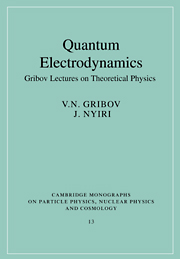Elementary Particles and the Laws of Physics
Developing a theory that seamlessly combines relativity and quantum mechanics, the most important conceptual breakthroughs in twentieth century physics, has proved to be a difficult and ongoing challenge. This book details how two distinguished physicists and Nobel laureates have explored this theme in two lectures given in Cambridge, England, in 1986 to commemorate the famous British physicist Paul Dirac.
Given for nonspecialists and undergraduates, the talks transcribed in Elementary Particles and the Laws of Physics focus on the fundamental problems of physics and the present state of our knowledge.
Professor Feynman examines the nature of antiparticles, and in particular the relationship between quantum spin and statistics. Professor Weinberg speculates on how Einstein's theory of gravitation might be reconciled with quantum theory in the final law of physics.
Highly accessible, deeply thought provoking, this book will appeal to all those interested in the development of modern physics.
- Feynman and Weinberg are both Nobel Prize-winners for physics
- Feynman and Weinberg are both best-selling popular science and textbook authors
- Hardback edition has sold over 13,000 copies
Reviews & endorsements
"...a book that all physicists will be pleased to have on their shelves, and one that will surely stimulate aspiring theoretical physicists." New Scientist
Product details
No date availableAdobe eBook Reader
9780511251658
0 pages
0kg
28 b/w illus. 1 table
This ISBN is for an eBook version which is distributed on our behalf by a third party.
Table of Contents
- Foreword John C. Taylor
- 1. The reason for antiparticles Richard P. Feynman
- 2. Towards the final laws of physics Steven Weinberg.



